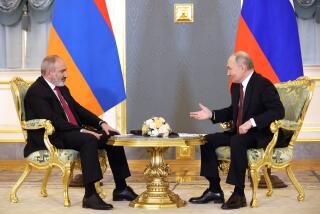Regional Disputes Surround, Strangle Once-Stable Armenia
YEREVAN, Armenia — To the east live sworn enemies in Azerbaijan, where an 8-year-old war over the Nagorno-Karabakh enclave is dormant but no less dangerous for a tiny landlocked country without nearby friends.
To the west, Armenia has a second wall of diplomatic silence with Turkey, unable to forgive its historic adversary for taking sides in the Nagorno-Karabakh conflict and unwilling to forget the Ottoman massacre of 1915 in which 1.5 million Armenians were killed.
To the north, because of an unresolved conflict between the former Soviet republic of Georgia and its Abkhaz minority, the main rail link from Armenia to its biggest market in Russia has been severed.
Only to the south, along a narrow 20-mile stretch of mountainous border, is there a relatively unobstructed outlet for Armenian trade and traffic--through Iran, which has its own international troubles.
Adding a disturbing backdrop to the tense domestic scene that erupted in violence this week, this once-stable and somewhat prosperous former Soviet republic is surrounded and being strangled by regional disputes.
And despite claims from the highest offices here of a desire to make peace with neighbors, the outlook for any easing of Armenia’s precarious regional relations appears as grim as that for mending the volatile internal rifts.
*
The chief strategist behind President Levon Ter-Petrosyan contends that Armenia is engaged in “a constructive dialogue” with Azerbaijan over a Nagorno-Karabakh settlement and with Turkey to establish trade and diplomatic relations.
But the government’s collective view is that the onus for compromise lies on the other side of both conflicts.
The greatest hindrance to relief of regional frictions is the general acceptance here of the status quo in Nagorno-Karabakh, where a 2-year-old cease-fire allows Armenia to control the enclave as well as much of the rugged Azerbaijani territory that separates it from Armenia.
“We are satisfied with the current state of affairs,” says Lenser Aghalovyan, head of the nationalist Artsakh-Ayastan Party and a native son of Nagorno-Karabakh. “The longer we can prolong this situation, the better.”
Official Armenian policy differs from the radical opposition’s position only in the government’s stated willingness to retreat from some seized lands in exchange for a permanent peace settlement. That would allow tens of thousands of displaced Azeri civilians now huddled in refugee camps to return home in exchange for recognition of the enclave’s independence from Azerbaijan.
Turkey has held relations with Armenia hostage to a settlement of the war and trade blockade. “The ball is in Turkey’s court. We’ve done what we can do,” Deputy Foreign Minister Vartan Oskanyan says. He contends that Turkey must change its conditions for establishing relations and clearing the trade path between Armenia and the Middle East.
Likewise, the diplomat sees no need for a course correction over Nagorno-Karabakh.
“The status quo is satisfactory for us, as Armenia controls the territory, there is no war, and the corridor is open” through occupied Azerbaijani lands, Oskanyan says.
More to Read
Sign up for Essential California
The most important California stories and recommendations in your inbox every morning.
You may occasionally receive promotional content from the Los Angeles Times.











